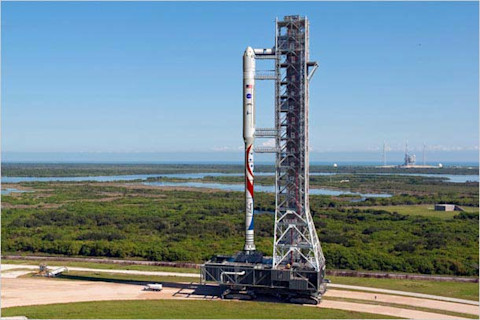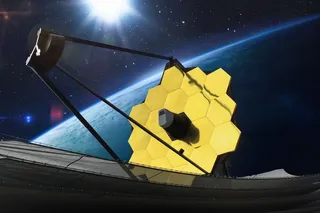
The Ares I rocket, scrapped during President Obama's overhaul of NASA, may be making a comeback. Two rocket-makers say that they have reached a plan to salvage the design of Ares I and use it to compete in the private competition to provide post-shuttle space taxi service to NASA. The partners are Alliant Techsystems of Minneapolis (ATK) and the European company Astrium, which builds Ariane 5 rockets to carry satellites into space. Today they are announcing their collaboration on the new 300-foot rocket.
The new rocket, named Liberty, would be much cheaper than the Ares I, because the unfinished NASA-designed upper stage of the Ares I would be replaced with the first stage of the Ariane 5, which has been launched successfully 41 consecutive times. The lower stage of the Liberty, a longer version of the shuttle booster built by ATK, would be almost unchanged from the Ares I. [The New York Times]
To truly go ahead with the project, the two companies will need to snag at least some of the $200 million in funding NASA is set to give next month to private companies developing space taxi technology. Giants like Lockheed Martin and Boeing, as well as newer private space companies
like SpaceX
, are all competing for these dollars and contracts.
There has been deep concern in the US Congress about the length of time it might take to provide commercial alternatives, leaving America reliant on Russian Soyuz vehicles until perhaps the latter part of this decade. But ATK and Astrium believe their experience means they could have the 90m-high (300ft) Liberty rocket ready to fly by 2013, and operational with astronauts on board by 2015. [BBC News]
The two companies are targeting a price of $180 million per launch as a way to undercut the price of the Atlas V
rocket launches by the Boeing-Lockheed Martin collaboration called United Launch Alliance, which currently dominates the market. And launching astronauts may not be the only ambition of ATK and Astrium.
To make it as versatile as possible, the rocket is being designed to be able to carry the widest array of space capsules now under development by NASA, as well as individual U.S. contractors. Though EADS and Alliant Techsystems spokesmen play down the concept, the trans-Atlantic venture's longer-term significance may be to shake up the global aerospace industry by emerging as a powerful new competitor to launch commercial telecommunications satellites into orbit. [Wall Street Journal]
Related Content: DISCOVER: Launching Into the Era of Private Spaceflight
—The Dream Chaser Bad Astronomy: Obama Lays Out Bold Revised Space Policy
80beats: SpaceX Gets First Commercial Permit to Make Orbital Round-Trips
80beats: New NASA Rocket May Not Be “Useful,” White House Panel Says
Image: ATK













